Pregnancy
Preparing for Pregnancy
Preparing for Pregnancy
Even before you become pregnant, your health matters to your future baby. Adopt good health habits today. And take care of any health problems you have before becoming pregnant.
Remember
As soon as you know you are pregnant, get regular prenatal care.
Things to consider
Read through the list below. The more items that describe you, the healthier you may be:
-
I eat a balanced diet.
-
I keep physically active.
-
I have my health problems under control.
-
My weight is about right.
-
I don’t smoke.
-
I don’t use recreational drugs.
-
I don’t have a drinking problem.
Think about the following:
-
Who will help you through pregnancy and with childcare?
-
Do you have health insurance?
-
Do you have the money needed to cover childcare and other day-to-day child expenses?
-
Will you be able to take the time you need away from your job for maternity needs and childcare?
Adopt a healthy lifestyle
Each of the following tips can improve your health as you prepare for pregnancy:
-
Take folic acid 400 to 800 micrograms or a prenatal vitamin daily.
-
Eat a healthy, well-balanced diet.
-
Exercise 3 or more times a week and at least 150 minutes weekly.
-
Get within 15 pounds of your ideal weight.
The first weeks of pregnancy are the most important time in a baby’s development. Before you become pregnant:
-
Don’t use recreational drugs.
-
Don’t drink alcohol.
-
Don’t smoke.
-
Get advised vaccines.
Working with your healthcare provider
Your healthcare provider can help answer any questions you may have. Do you know when to stop taking birth control pills? Are any over-the-counter medicines safe for pregnant people? You can also ask about special care you may need if you have any of the following:
-
Sexually transmitted infections, such as herpes or chlamydia
-
Diabetes
-
High blood pressure
-
Other long-term (chronic) health problems
Your First Trimester Changes
Pregnancy: Your First Trimester Changes
The first trimester is a time of rapid development for your baby. Because your baby is growing so quickly, it is important that you start a healthy lifestyle right away. By the end of the first trimester, your baby has formed all of its major body organs and weighs just over an ounce.
Month 1 (weeks 1 to 4)
The placenta (the organ that nourishes your baby) begins to form. The brain, spinal cord, heart, gastrointestinal tract, and lungs begin to develop. Your baby is about ¼ inch long by the end of the first month.
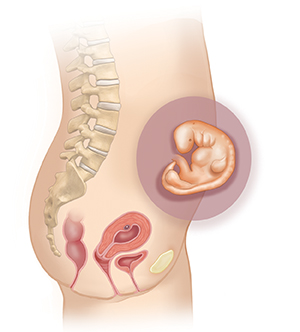
Month 2 (weeks 5 to 8)
All of your baby’s major body organs form. The face, fingers, toes, ears, and eyes appear. By the end of the month, your baby is about 1 inch long.
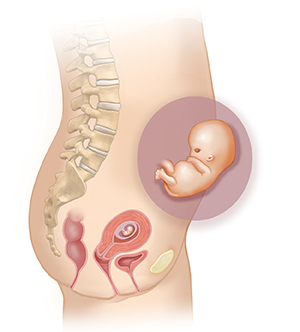
Month 3 (weeks 9 to 12)
Your baby can open and close its fists and mouth. The sexual organs begin to form. As the first trimester ends, your baby is about 3 inches long.
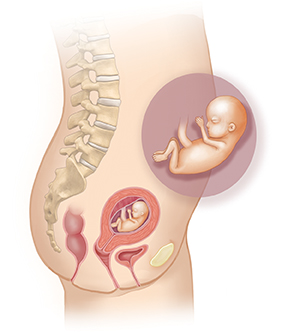
Your Second Trimester Changes
Pregnancy: Your Second Trimester Changes
Each day, you and your baby are changing and growing together. Here’s a quick look at what’s happening to both of you.
How you are changing
Even when you don’t notice it, your body is adapting to meet the needs of your growing baby. The changes in your body might also affect your moods.
Your body
Your uterus expands as your baby grows. As the weeks go by, you will feel more pressure on your bladder, stomach, and other organs. You may notice some skin color changes on your forehead, nose, or cheeks. Freckles may darken, and moles may grow. You may notice a darker line on your abdomen between your belly button and pubic bone in the midline.
Your moods
The second trimester is often easier than the first. Still, be prepared for mood swings. These are from the increase in hormones made by your body. Hormones are chemicals that affect the way organs work. These mood swings are a normal part of pregnancy.
How your baby is growing
Month 4
Your baby’s heartbeat may be heard with a Doppler (handheld ultrasound device) by 9 to 10 weeks. Eyebrows, eyelashes, and fingernails begin to form.
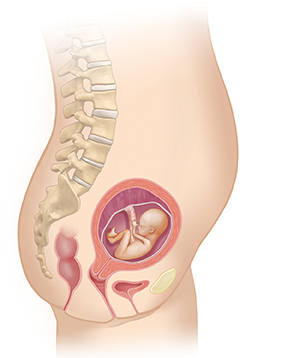
Month 5
You may feel your baby move. After a growth spurt, your baby nears 10 inches.
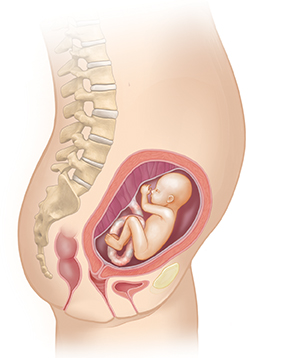
Month 6
Your baby’s fingerprints have formed. Your baby weighs about 1 to 2 pounds (0.45 to 0.91 kg) and is about 12 inches long.
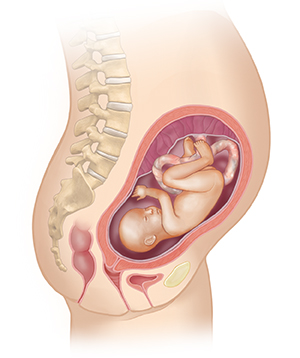
Your Third Trimester Changes
Pregnancy: Your Third Trimester Changes
As the baby grows, your body changes, too. You may also see signs that your body is getting ready for labor. Be patient. Within a few more weeks, your baby will be born.
How you are changing
Your body is preparing for the birth of your baby. Some of the most common changes are listed below. If you have any questions or concerns, ask your healthcare provider:
-
You’ll gain more weight from fluids, extra blood, and fat deposits.
-
Your breasts will grow as your body gets ready to feed the baby. They may be more tender. You may also notice a slight yellow or white discharge from the nipples.
-
Discharge from your vagina may increase. This is normal.
-
You might see some skin color changes on your forehead, cheeks, or nose. Most of these will go away after you deliver.
-
You may have symptoms such as heartburn, trouble sleeping, and some shortness of breath due to the growing fetus.
-
Your belly button may stick out.
-
Near term, you may feel the baby "dropping" or moving downward toward the pelvis.
-
You may get hemorrhoids from pressure of the growing baby on rectal veins.
How your baby is growing
Month 7
Your baby can open and close their eyes and weighs around 4 pounds (1.8 kg). The baby's bones are fully formed but soft. The baby's movements are pretty forceful. The hair on your baby's body called lanugo, starts to fall off. The lungs are not fully developed, but practice "breathing" movements occur.
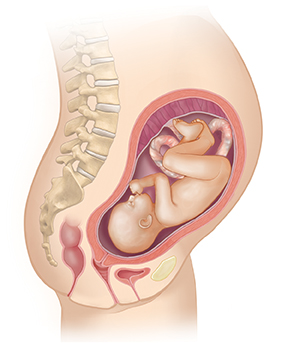
Month 8
Your baby is building up body fat and weighs around 6 pounds (2.7 kg). The protective waxy coating around the baby called vernix, gets thicker. Your baby is now getting bigger and has more fat stores. Due to reduced space in the uterus, the baby's movements may become less forceful. But you will still feel the wiggles and stretches as your little one moves.
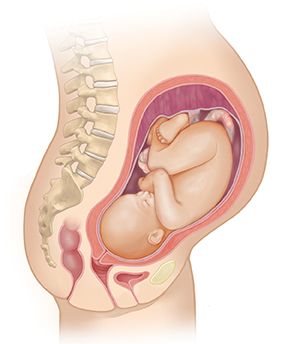
Month 9
Your baby weighs nearly 7 pounds (3.2 kg) and is about 19 to 21 inches long. The baby's organs are ready to function on their own. In most pregnancies, the baby may turn into a head-down (cephalic) position for birth as the due date approaches. In other words, any day now...

When to call your healthcare provider
Seek medical help right away for any of the following:
- Reduced or absent fetal movements
- Bleeding or excess watery discharge from the vagina
- Excessive swelling in your feet, legs, or other areas of your body
- Severe headache, nausea, rash, bleeding from any site, or yellowing of the eyes or skin
- Severe belly pain or contractions
- Fever
